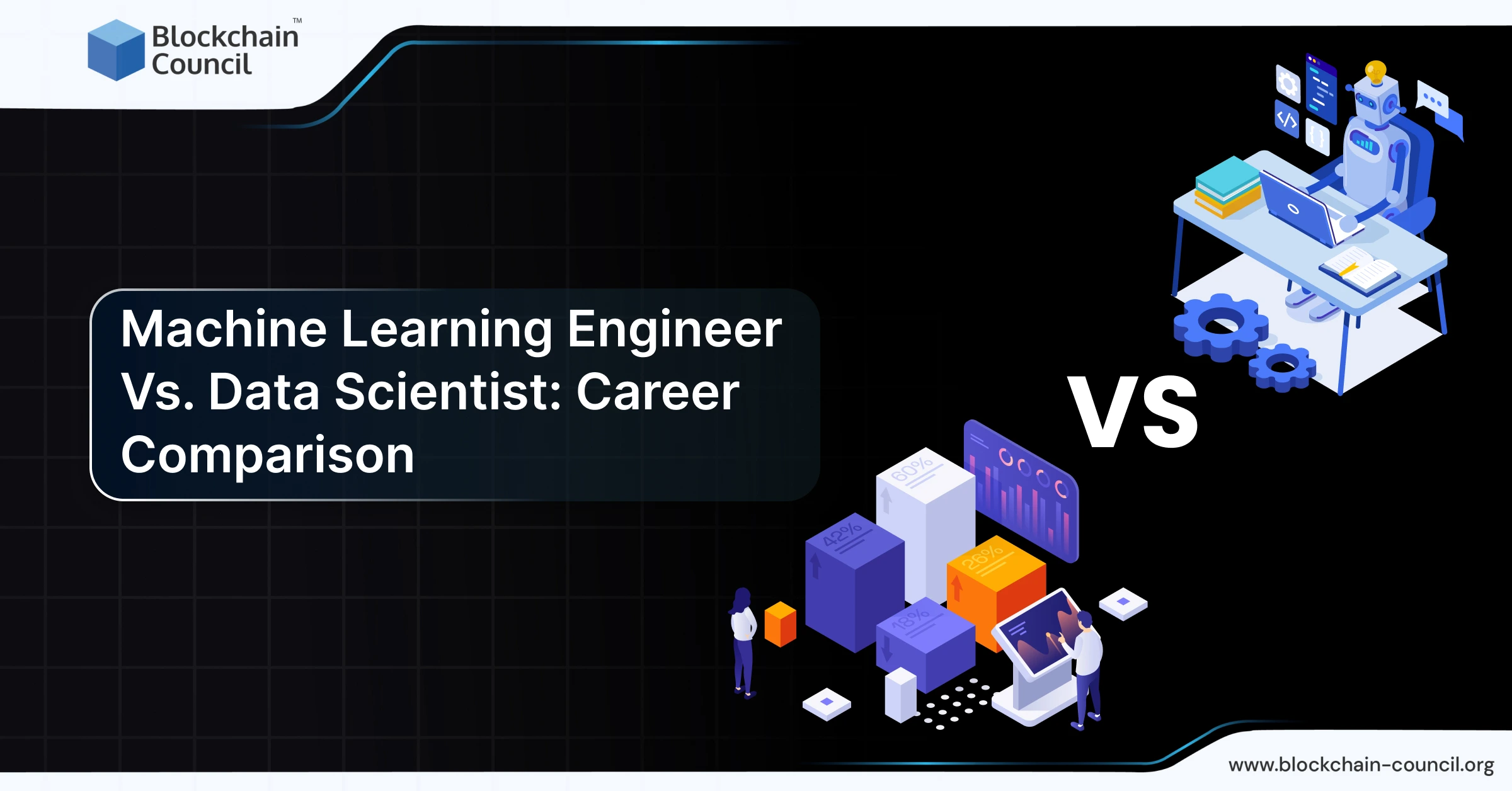
- Blockchain Council
- September 25, 2024
When thinking about careers in tech, two popular roles that often come up are Machine Learning Engineer and Data Scientist. Both positions are common in the industry, but each focuses on different skills and daily tasks.
Overview
Machine Learning Engineers create algorithms and models that enable machines to understand and make their own decisions independently. They’re involved in creating, testing, and maintaining systems that use these models in real-world applications. Data Scientists, however, dive into analyzing large datasets to find insights that guide company decisions. They use statistical techniques and machine learning methods but focus more on analyzing data than on developing models from scratch.
Key Responsibilities
Data Scientist:
- Data Collection and Analysis: Data Scientists gather information from various sources, clean it up, and study it to find trends. Statistical methods and machine learning techniques help them grasp the data.
- Data Visualization: They create visuals and reports to present their findings, making it simpler for team members who aren’t technical to grasp the results.
- Model Building: Data Scientists develop predictive models to help forecast trends, make informed decisions, and spot opportunities for businesses.
- Communication: A big part of their job involves sharing their insights with others, especially those who don’t have a technical background.
Machine Learning Engineer:
- Model Deployment and Optimization: Machine Learning Engineers take the models Data Scientists create and implement them, making sure they run smoothly across different systems.
- Building ML Systems: They write code to develop strong machine learning systems, often using frameworks like TensorFlow or PyTorch.
- Testing and Maintenance: Engineers run tests on models to ensure they are accurate and performing well, making tweaks as needed.
- Infrastructure Management: They manage the technical setup needed to run machine learning models, such as cloud services and data pipelines.
Skills and Education
Skills for Data Scientists:
- Programming: It’s important for data scientists to be comfortable using programming languages such as Python, R, and SQL. These tools are key for managing data, running analyses, and creating models.
- Statistical Analysis: A strong grasp of statistics, probability, and machine learning principles is also necessary. This knowledge helps in interpreting data correctly and applying the right methods.
- Data Visualization Tools: Being skilled with platforms like Tableau or Power BI is helpful. These tools allow scientists to present insights in a clear and meaningful way.
- Problem-Solving and Critical Thinking: They tackle challenges systematically, finding data-driven solutions that support decisions.
Skills for Machine Learning Engineers:
- Programming and Software Development: Proficiency in coding languages like Python, Java, or C++ is necessary for developing and deploying machine learning algorithms.
- Machine Learning Frameworks: Having hands-on experience with TensorFlow, PyTorch, and scikit-learn is essential for developing models.
- System Design: Knowledge of system architecture, data modeling, and distributed computing helps engineers design efficient systems.
- Cloud Computing: Understanding platforms like AWS, Google Cloud, or Azure is often needed as these are commonly used for running ML models.
Education
To work in either of these roles, you’ll typically need a bachelor’s degree in computer science, data science, or something similar. Data Scientists often pursue further education, like a master’s or Ph.D. You’ll usually need a degree in areas like data science, statistics, or similar fields. Machine Learning Engineers might also get certifications in cloud computing or specific machine learning technologies to expand their skills.
Salary and Job Outlook
Salary
Machine Learning Engineers usually make about $125,558 a year, though this can differ depending on factors like experience, location, and industry. Data Scientists tend to earn slightly more, with an average salary around $129,189 annually, especially in tech hubs like California.
Job Growth
The demand for Data Scientists is projected to rise by 35% from 2022 to 2032, driven by the increasing need for data-informed decision-making in various fields. Machine Learning Engineers are also in high demand, with a growth rate expected to reach 40%, fueled by the rapid development of AI and automation technologies.
Work Environment and Culture
Data Scientists usually work in teams, collaborating with stakeholders, analysts, and other team members. Their work mainly revolves around data analysis, creating visualizations, and building models that help organizations make sense of their data. Machine Learning Engineers usually collaborate with Data Scientists, DevOps teams, and software developers. They focus on building, deploying, and maintaining models, while also tackling technical challenges like optimizing systems and managing complex infrastructure.
Challenges in Each Role
Data Scientists often deal with messy, unorganized data, spending a lot of time cleaning and preparing it for analysis. Communicating their findings to people without a technical background can also be difficult. Machine Learning Engineers face challenges like keeping models running well, managing biases, scaling systems, and integrating models into existing setups. Keeping up with fresh tools and methods is crucial as the field keeps changing.
Choosing the Right Path
Deciding between these careers depends on what you enjoy and your strengths. If you like working with data, creating visual representations, and uncovering insights, becoming a Data Scientist might be the right choice. If you are more interested in creating and deploying complex models, coding, and solving technical issues, then a Machine Learning Engineer role could be a better fit.
Conclusion
Machine learning engineers and data scientists play a crucial part in today’s technology world. Data Scientists focus on data interpretation, while Machine Learning Engineers work on implementing these models effectively. Gaining practical experience through internships, projects, or specialized courses in both areas can help you figure out which path matches your interests and skills best.


































































 Guides
Guides News
News Blockchain
Blockchain Cryptocurrency
& Digital Assets
Cryptocurrency
& Digital Assets Web3
Web3 Metaverse & NFTs
Metaverse & NFTs
